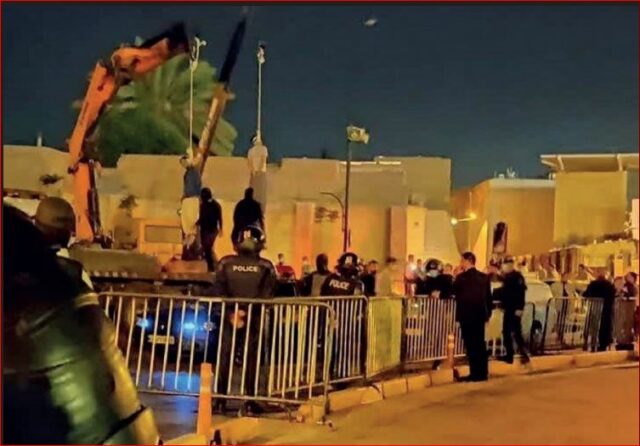The cover of the 63-page report shows the public hanging of Afghan nationals Mohammad Ramez Rashidi and Naeim Hashem Ghotali in Shiraz, Iran on 8 July 2023.
Iran executed 834 people in 2023, up by a staggering 43 per cent since 2022, according to a report published Tuesday. This is the second time in two decades that the execution toll has crossed the 800 mark in a year, after 972 executions in 2015.
The annual report, released jointly by the Paris-based Together Against the Death Penalty and the Norway-based Iran Human Rights (IHR), said Iran used the death sentence to instil fear among its citizens during and after the massive protests of 2022-23. The protests were sparked by the custodial death of 22-year-old Masha Amini, who was arrested for violating the country’s strict dress code in September 2022.
Only 15 percent of the recorded executions were announced by official Iranian media in 2023, and IHR confirmed the other executions through its own sources.
“Instilling societal fear is the regime’s only way to hold on to power, and the death penalty is its most important instrument,” IHR director Mahmood Amiry-Moghaddam said in the report. Women played a major role in the protests, which perhaps explains why at least 22 women were executed in 2023, the highest number in the past decade. Fifteen of them were hanged on murder charges.
“The execution of ‘Woman, Life, Freedom’ protesters began in December 2022 with Mohsen Shekari and Majidreza Rahnavard’s hasty executions and continue to this day. In 2023, eight more protesters were executed for security-related and murder charges. Information and news on protester death penalty cases have been opaque and intentionally marred with disinformation to cause confusion and conflict from the outset’” the report says.
“Of particular concern is the dramatic escalation in the number of drug-related executions in 2023, which rose to 471 people, more than 18 times higher than the figures recorded in 2020,” said the report. It also flagged the fact that ethnic minorities, particularly the Sunni Baluch from the country’s southeast are “grossly overrepresented” amongst those executed on drug-related charges. At least 167 people, or 20 per cent of the total executions in 2023, were from the Baluch minority, which comprises a mere five per cent of the country’s population.
Noting that most hangings in Iran are conducted within prison compounds, the report notes that “the number of public executions dropped dramatically due to enforced restrictions after the onset of the COVID-19 pandemic, with no public executions recorded in 2021. After two years, two public executions, including that of a protester, were carried out in 2022. In 2023, seven executions were carried out in public.
“In murder cases where the defendant is sentenced to qisas, (retribution) the plaintiff (victim’s family or next of kin) not only bears the responsibility of choosing execution, but a representative of the next of kin (either the next of kin themselves, their lawyer or a nominated representative) must be present at the scene of the execution,” says the report.
“Since Iranian law considers qisas to be the right of the victim’s family, they are also encouraged to carry out the execution themselves.
Iran Human Rights has received several reports where the victim’s family members have physically carried out the execution. In 2021, two women’s executions were carried out by their own children. In 2023, Hossein Dulkhani was executed by his parents in Ilam Central Prison for the honour killing of his sister, and Mohammad Parhizkar was hanged by his maternal uncle in Rasht Central Prison,” it says.
Public disaffection with the theocratic regime was clearly reflected in the March 1 parliamentary elections, the first since the protests, which saw the lowest turnout since the Iranian revolution of 1979 and allowed the Conservative clergy to cling to power.
According to IHR, Iran has already executed at least 83 people in 2024. “I am afraid we will be facing more executions unless the international community shows a stronger reaction,” Amiry Moghaddam said.
Also See
















